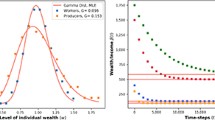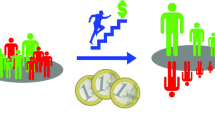Abstract:
We consider a simple model of a closed economic system where the total money is conserved and the number of economic agents is fixed. Analogous to statistical systems in equilibrium, money and the average money per economic agent are equivalent to energy and temperature, respectively. We investigate the effect of the saving propensity of the agents on the stationary or equilibrium probability distribution of money. When the agents do not save, the equilibrium money distribution becomes the usual Gibb's distribution, characteristic of non-interacting agents. However with saving, even for individual self-interest, the dynamics becomes cooperative and the resulting asymmetric Gaussian-like stationary distribution acquires global ordering properties. Intriguing singularities are observed in the stationary money distribution in the market, as functions of the marginal saving propensity of the agents.
Similar content being viewed by others
Author information
Authors and Affiliations
Additional information
Received 2 May 2000
Rights and permissions
About this article
Cite this article
Chakraborti, A., Chakrabarti, B. Statistical mechanics of money: how saving propensity affects its distribution. Eur. Phys. J. B 17, 167–170 (2000). https://doi.org/10.1007/s100510070173
Issue Date:
DOI: https://doi.org/10.1007/s100510070173




